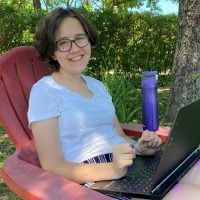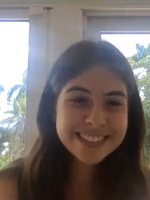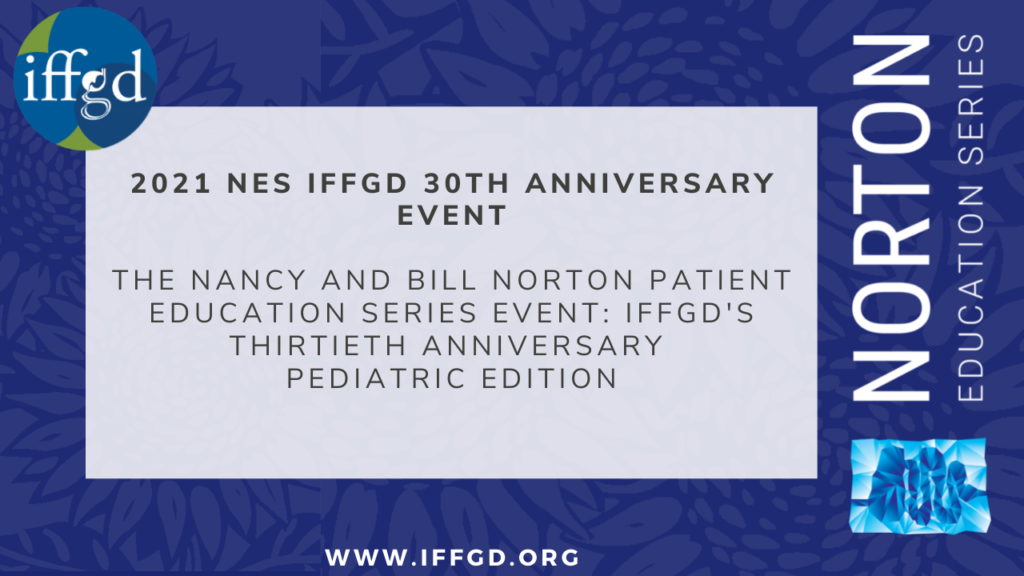2021 NES IFFGD 30th Anniversary Event:
Virtual Pediatric Edition
To commemorate the 30th anniversary of the International Foundation for Gastrointestinal Disorders, we hosted a very special virtual edition of the Norton Education Series (NES). The Nancy and Bill Norton Patient Education Series Event: IFFGD’s Thirtieth Anniversary Pediatric Edition is now available.
The pediatric edition provides education and insight for parents, caregivers, family, pediatric patients and adolescent patients living with a chronic GI disorder. By engaging this community in an educational program, we expect to promote a greater understanding of the daily experience of their chronic GI illnesses and provide real-world insights to better reach their treatment and wellness goals.
William Chey, MD will Chair the Program Committee and Carlo Di Lorenzo, MD and Samuel Nurko, MD will serve as Co-Chairs. The mission and purpose of the NES is to provide useful information about gastrointestinal (GI) disorders to help the many people who suffer from these conditions. This free virtual event includes medical education sessions, parent perspectives, patient perspectives, and open panel discussion sessions.
Gastroesophageal Reflux Disease (GERD) – Pediatric
Rachel Rosen, MD, MPH

Rachel Rosen, MD, MPH is Attending Physician, Division of Gastroenterology, Hepatology, and Nutrition; Director, Aerodigestive Center at Boston Children’s Hospital and Associate Professor of Pediatrics, Harvard Medical School
Presentation Overview: Gastroesophageal Reflux Disease (GERD) occurs in more than 80% of infants in the United States, and then symptoms can be burdensome for the child and the parent. In this presentation, Dr. Rachel Rosen shares her unique insights on why diagnosing GERD in infants is so vital, how to recognize nonacid reflux, treatment options currently available for children, and nutritional strategies to help patients manage reflux in infants.
Pseudo-Obstruction and Other Primary Motility Disorders – Pediatric
Nikhil Thapar, MRCP, FRCPCH, FRACP, PhD

Professor Nikhil Thapar is Director of the Gastroenterology, Hepatology and Liver Transplant service at Queensland Children’s Hospital, Brisbane, Australia where he leads a specialist statewide multidisciplinary clinical service for children with gastrointestinal motility and functional disorders. He was Academic Lead for Paediatric Gastroenterology and head of the Neurogastroenterology and Motility service at Great Ormond Street Hospital and University College London Great Ormond Street Institute of Child Health (London, UK). Read more
Presentation Overview: Primary gastrointestinal motility disorders are a heterogeneous group of disorders that affect the neuromuscular (nerve and muscle) components of the gastrointestinal tract and limit its ability to push contents along the length of its lumen. These disorders include esophageal achalasia, gastroparesis, intestinal pseudo-obstruction, Hirschsprung disease and slow transit constipation. Recent year have seen attempts to standardise the diagnosis and management of such disorders. Overall, their diagnosis needs to be timely, accurate and definitive, which requires expertise of the conditions and criteria for their diagnosis as well as access to appropriate investigative tools (e.g. motility testing, tissue assessment). Management is largely supportive and often best served in specialist centres with an expert multidisciplinary team. The mainstay for therapy includes the provision of essential nutrition, reducing symptoms and disease progression, limiting complications and ultimately improving outcomes and quality of life. For most conditions this currently involves surgery. The future holds potential for a better understanding of these conditions as well as improved diagnostics and more effective innovative therapies.
Irritable Bowel Syndrome (IBS) – Pediatric
Carlo Di Lorenzo, MD

Dr. Carlo Di Lorenzo is Professor of Pediatrics at The Ohio State University and Chief of the Division of Pediatric Gastroenterology at Nationwide Children’s Hospital. He holds the Robert F. and Edgar T. Wolfe Foundation Endowed Chair in Pediatric Gastroenterology. For the past 30 years, the focus of his academic activities has been the diagnosis and treatment of functional and motility disorders in children of any age. He has published more than 300 peer-review and invited manuscripts in the field of Read more
Presentation Overview: In the United States, approximately 10-12% of children fulfill the diagnostic criteria for irritable bowel syndrome/functional abdominal pain disorder. An Average cost just for testing accounts for about $6,104.00 per patient. In this presentation, Dr. Carlo Di Lorenzo explains the pathophysiology of this condition, the role parents play in helping their child manage their symptoms, alarm signs that should lead to testing, and the importance of prompt testing, treatment options, and more.
Colic and Other Functional Disorders in the First Year of Life
Marc Benninga, MD

Professor Marc Benninga studied medicine at the University of Amsterdam, the Netherlands. After receiving his Medical degree he worked as a research fellow at the department of paediatric gastroenterology and nutrition at the Academic Medical Centre in Amsterdam with Jan Taminiau and Hans Büller. He performed extensive research on constipation and faecal incontinence in childhood. Subsequently he was trained in paediatrics at the Wilhelmina Children’s Hospital in Utrecht, The Netherlands. Read more
Presentation Overview: Functional gastrointestinal disorders (FGIDs), such as colic, regurgitation, diarrhea and constipation are common worldwide and cover a wide range of disorders attributable to the gastrointestinal tract that cannot be explained by structural or biochemical abnormalities. The diagnosis of these disorders relies on symptom-based criteria, the so-called Rome criteria. In 2016 the Rome criteria were revised for infants/toddlers and for children and adolescents. Read full overview
Physician Introduction to Nausea and Vomiting – Pediatric
Katja Kovacic, MD

Dr. Kovacic is an Associate Professor of Pediatrics and Director of Pediatric GI Motility and Cyclic Vomiting Syndrome programs at the Medical College of Wisconsin. She runs the pediatric Cyclic Vomiting Syndrome program at Children’s Wisconsin hospital. She is funded by the NIH, investigating brain-gut disorders with a focus on functional nausea and vomiting disorders and non-invasive neuromodulation therapy. She has received the 2017 NASPGHAN Balistreri Prize for Excellence in Research, the 2018 International Foundation for GI Disorders (IFFGD) Pediatric Scientist award and numerous other awards for her research.
Presentation Overview: A “Physician Introduction to Nausea & Vomiting” opens the door to the many complexities and controversies surrounding the diagnosis and management of functional nausea and vomiting disorders. Dr. Kovacic discusses the many diagnostic possibilities, overlapping conditions and our tendency to want to find labels for conditions without truly understanding the complex pathophysiology.

Dr Miguel Saps is a native of Uruguay. He has received his medical and pediatrics degree from the Universidad de La República Faculty of Medicine in Uruguay, a pediatric residency at Maimonides Medical Center, and a fellowship in pediatric gastroenterology at the Children’s Hospital of Pittsburgh.
Dr Saps is the Chief of Division Pediatric Gastroenterology, Hepatology and Nutrition, Director of Pediatric Neurogastroenterology and Motility at Holtz Children’s Hospital of Miami, The George E. Bachelor Chair in Pediatrics and Professor of Pediatrics at the University of Miami. Read more
Presentation Overview: Four in ten children suffer from abdominal pain every week during the school year. The symptoms of abdominal pain can be very bothersome for many patients. Often, there is no organic explanation for abdominal pain, but it can be explained by an imbalance in the body and the connection between the brain and the gut. In this presentation, Dr. Miguel Saps explains the symptoms associated with abdominal pain, the importance of patient and doctor communication, and different treatment options and why they may be used.
Parent Perspective on Upper GI Problems – Cyclic Vomiting Syndrome
Jenny Johnson Granstrom

My name is Jenny, and I am Mom to Eleanor who has CVS (Cyclic Vomiting Syndrome). I am also a high school teacher and a volunteer for the CVSA (Cyclic Vomiting Syndrome Association). Eleanor had her first episode at 3-years-old, vomiting every 20 minutes for hours on end until we got to an ER. She was diagnosed at 6-years-old and since then has spent many hours at doctor’s offices and in the hospital. Eleanor’s illness peaked at its worst between the ages of 9-13. Her first hospital admission was at 9-years-old and lasted a week. She is now 15-years-old and doing quite well managing her illness. As a parent, all we want is to find a solution to our child’s pain and suffering, but with CVS that is often not possible. Learning to navigate appointments, medicines, schedules and model hopefulness when your child is hurting is hard. It’s helpful if parents can learn and lean on other parents in similar situations. In my talk I’ll share a few ideas about what has helped us and what I wish I knew at the beginning of our journey.
Patient Perspective on Upper GI Problems – Cyclic Vomiting Syndrome
Eleanor Granstrom

My name is Eleanor Granstrom, daughter of Jenny Johnson Granstrom. I’m fifteen years old and attend Evanston Township Highschool in Evanston, IL. At six years old I was diagnosed with Cyclic Vomiting Syndrome. Over the years I was diagnosed with more minor chronic illnesses. I also experienced the trauma of staying at a hospital as a little kid, anxiety, and depression. Throughout it all I’ve kept my immense love of reading and swimming. I’ve also discovered even more passions, including writing and skiing. Discovering new passions has helped me remember life is enjoyable at times when I wasn’t in enjoyable situations. Reading and writing has been a particularly huge coping strategy for me. In an interview format, my Mom and I will be talking about tips I’ve picked up and things that I wish my mom and I knew when I was starting to get sick.
Open Panel Discussion on Upper GI Symptoms -Pediatric
Physician Introduction on Constipation and Irritable Bowel Syndrome – Pediatric
Samuel Nurko, MD, MPH

Samuel Nurko, MD, MPH is Director, Center for Motility and Functional Gastrointestinal Disorders; Director, Functional Abdominal Pain Program at Boston Children’s Hospital and Professor of Pediatrics, Harvard Medical School
Dr Nurko was born and raised in Mexico City, where he completed his medical education at the Universidad Nacional Autonoma de Mexico. He completed his pediatric residency at Boston City Hospital and Massachusetts General Hospital, and completed his fellowship in pediatric gastroenterology at Boston Children’s Hospital, where he created the Center for Motility and Functional Bowel Disorders. Read more
Presentation Overview: There is a very high prevalence of constipation in the pediatric population, with a median range of 8.9% of children being impacted. The quality of life for many children living with constipation can be very low. When abdominal pain with constipation is associated with constipation that does not respond to laxatives, the could be diagnosed with irritable bowel syndrome with constipation (IBS-C). In this presentation, Dr. Samuel Nurko defines constipation and IBS-C, how they are diagnosed, and how constipation and IBS-C can be treated in children today.
Physician Introduction on Hirschsprung’s Disease and Anorectal Malformations – Pediatric
Lusine Ambartsumyan, MD

Dr. Ambartsumyan is currently an Associate Professor of Pediatrics at University of Washington and the Director of the Gastrointestinal Motility Program at Seattle Children’s Hospital. Her time is spent caring for children with gastrointestinal motility disorders in the inpatient and outpatient settings, outreach and regional clinics, and in the multidisciplinary clinics in conjunction with Divisions of Urology and Surgery at Seattle Children’s Hospital. Read more
Presentation Overview: The incidence of Hirschsprung’s disease ranges from 1 in 5,000 to 1 in 10,000, and incidences of anal rectal malformation range from 1 in 5,000 and slightly more common in males. In this presentation, Dr. Lusine Ambartsumyan provides a detailed explanation of Hirschsprung’s disease and anal rectal malformation, reviews what could become postoperative surgical, and functional complications in children, and illustrates the complete workout of children with Hirschsprung disease and anal rectal malformation who experience late postoperative complication.

Seth Miles and Susan Trujillo are the parents of 17 year old, Ava-Riley Miles. Seth shares the story of Ava-Riley’s diagnosis journey and what they as parent’s have learned.

Ava-Riley Miles is an active 17 year old high school senior. She shares her journey illness diagnosis journey and insights for others.

In 2013, Dr. Jose Garza joined the GI Care for Kids family. His training and interest in neurogastroenterology and motility bring specialized unique skills to our practice. Now GI Care for Kids is among a few centers in the country able to offer advanced motility studies for our patients.
Prior to joining GI Care for Kids Dr. Garza was Assistant professor of Pediatrics at Cincinnati Children’s Hospital; one of the leading centers in the country for gastrointestinal care, where he taught fellows and residents, performed motility studies and therapeutic Read more
Presentation Overview: Less than 50% of adolescent and young adults living with chronic illnesses receive pediatric to adult transition planning. In this presentation, Dr. Jose Garza explains what transition care is as well as the main goals. He also explains how to transition from a pediatric healthcare provider to an adult provider, and how to achieve self-management knowledge, skills and navigation abilities to function as a literate and self-directed health care consumer.

Sasha Zolik is a graduate of Georgetown University and a professional wife and mother. She lives in Teton Village, Wyoming. She is a fierce advocate for all of her children but has learned how to be a true warrior momma for her eldest who suffers from major GI motility issues and is TPN dependent. When she is not fighting with insurance companies or holding doctors accountable, you can find her enjoying the outdoors. She has experience with nine domestic pediatric hospitals and their GI departments and is very happy with the hero doctors she has found along the way. These are the one who are willing to say: “I don’t know” and “let’s give this a try.” These doctors have become a part of her extended family. She is grateful to IFFGD for the support, expertise, advice, and guidance they have provided along the way.
This presentation is a glimpse into my experience as a parent as we navigate the shift to adult care. It includes some things that have worked for us as well as a hidden gem in the transition.

My name is Madeline Zolik. I’m 20 years old and the oldest of four siblings. I grew up in Jackson Hole, WY.
I’ve been on TPN since March of 2017, and before that, I was on enteral nutrition for two years. Currently, I cannot eat, but I have hope that will change in the future.
This fall, I will be starting my second year of college at New York University. I’m majoring in Bioethics and public policy in health sciences with a minor in disability studies. My hope is to go to school for an MD/MPH and practice pediatric palliative care. I was introduced to IFFGD through my little sister when she was doing a fundraising project. Since then, I have traveled with IFFGD to DDW and Harvard’s neurogastroenterology conference. I am honored to be here and thank all of you for your time!















